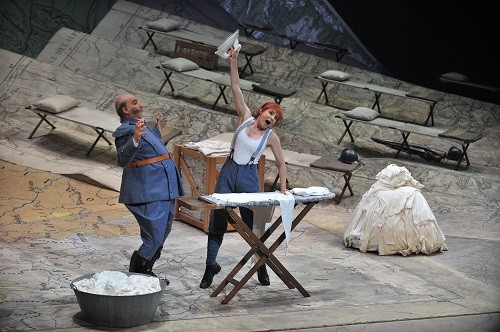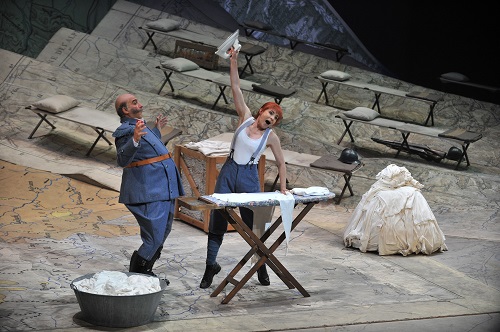 Spain Donizetti, La fille du régiment: Liceu Orchestra and Chorus / Giuseppe Finzi (conductor), Gran Teatre del Liceu, Barcelona, 24.5.2017. (JMI)
Spain Donizetti, La fille du régiment: Liceu Orchestra and Chorus / Giuseppe Finzi (conductor), Gran Teatre del Liceu, Barcelona, 24.5.2017. (JMI)

Cast:
Marie – Sabina Puértolas
Tonio – Javier Camarena
Sulpice – Simone Alberghin
Marquise Berkenfield – Ewa Podles
Hortensius – Isaac Galán
Caporal – Carlos Daza
Notary – Olivier Decriaud
Duchesse de Crakentorp – Bibiana Fernández
Production:
Direction – Laurent Pelly (original), Christian Rath (revival)
Sets – Chantal Thomas
Costumes – Laurent Pelly
Lighting – Joël Adam
Choreography – Laura Scozzi
In the long history of Barcelona’s Liceu, La fille du régiment has not often been performed. It has been done more frequently in the past 30 years, but always when an exceptional singer can be cast in the part of Marie or Tonio. After an absence of more than 100 years, the opera was staged in 1984 with Alfredo Kraus. In 1993, Edita Gruberova was the protagonist; and in 2010, when the opera was last here, Juan Diego Flórez sang the role of Tonio. Now the opera has returned to the Liceu with another divo, Javier Camarena. It is indeed a work that an important opera house cannot offer unless a remarkable singer is present.
This is the well-known Laurent Pelly production which premiered at Covent Garden in 2007 and has always been a hit. The director enters into the game of offering a fun opera, and he does a thorough job of it, particularly in the great stage work with the chorus. The other thing he gets – and this is really important – is the fact that the singers have a very good time on stage, at least as much so as the audience. Given the number of conceptual productions that one attends, it’s all the more interesting to see the work of a true man of the theatre, one who puts himself at the service of the opera.
The action is brought up to World War I, and the sets are simple, consisting in Act I of maps of Europe at war, and in Act II of a rather lavish but wall-less room. The costumes are appropriate for both the military and the reception of the guests. But what stands out above all else is the great work of stage direction by Laurent Pelly, full of imagination and effects that provoke laughter from the audience. Particularly noteworthy are the appearance of the Regiment in the final scene with a tank and Tonio on top of it; and in the final scene, during the ‘Salut à la France’, of a large painting of a cock who ends the opera with a ‘Kikirikí’ (although on this occasion it went almost unnoticed).
The musical direction was under Giuseppe Finzi, who conducted Il barbiere di Siviglia here three years ago. His conducting was not particularly convincing but it was effective, and he helped the singers by not covering them at any time. The chorus gave a strong performance, but the orchestra was not outstanding.
Marie, the daughter of the Regiment, is not only the protagonist – she sings more than anyone else here, although the final triumph is usually the tenor’s. Sabina Puértolas made a very convincing Marie and sang all her arias with gusto. She is an excellent light soprano, although her voice is somewhat reduced in size, especially at the top.
Tonio was Javier Camarena, and it must be said that the character fits him vocally like a glove. He sang with great brilliance the most-awaited aria, ‘Ah, mes amis’, with his well-known nine high Cs (which became 18 with the audience’s demands). Regardless of his brilliant interpretation of this aria, I preferred his elegant and heartfelt ‘Pour me raprocher de Marie’, which was, for me, the best part of the entire performance. However, the audience seemed to prefer the former. ‘Ah, mes amis’ received an exceptional ovation of almost three minutes. The bis, which was no less brilliant, did not reach one minute; of course, it was already known that there would be no second bis. ‘Pour me raprocher de Marie’ was applauded for about 30 seconds and deserved much more.
Sergeant Sulpice was interpreted by a rather modest Simone Alberghini, whose acting was better than his singing. Something similar can be said of Ewa Podles as the Marquise of Berkenfield. Her voice has less volume than it used to, and less appeal, although there is no doubt that she has won the love of the Barcelona public.
The secondary characters were well covered.
José M. Irurzun
